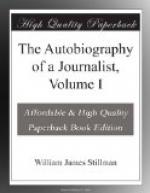Our winter in Paris had been greatly brightened by the acquaintance of the Brownings, the father and sister of the poet. We lived in the same section of Paris, near the Hotel des Invalides, and much of our time was passed with them. “Old Mr. Browning” we have always called him, though the qualification of “old,” by which we distinguished him from his son Robert, seemed a misnomer, for he had the perpetual juvenility of a blessed child. If to live in the world as if not of it indicates a saintly nature, then Robert Browning the elder was a saint: a serene, untroubled soul, conscious of no moral or theological problem to disturb his serenity, and as gentle as a gentle woman,—a man in whom, it seemed to me, no moral conflict could ever have arisen to cloud his frank acceptance of life as he found it come to him. He had, many years before we knew him, inherited an estate in Jamaica, but on learning that to work it to profit he must become a slave owner he renounced the heritage. And, knowing him as we knew him, it is easy to see that he would renounce it cheerfully and without any hesitation. A man of a rougher and more energetic type might have tried the experiment, or questioned the judgment, at least have regretted his own integrity, but Browning could have done neither. The way was clear, and the decision must have been as quick as that of a child to reject a thing it abhorred. His unworldliness had not a flaw. So beautiful a life can never have become distinguished in the struggles and antagonisms which make the career of the man of the world, or even the man of letters, as letters are now written; for he was a man, and the only one I ever knew, of whom one would say that he applied in the divine sense the maxim of Christ, “Resist not evil,”—he simply, and by the necessity of his own nature, ignored it.
He had a curious facility in drawing heads of quaint and always varied character, which character he could not foresee when he began the drawing. They were always in profile, and he began at one extremity and ran his pencil round to the other, always bringing out an individuality, but without any intention as to what that should be; and he named it, when it was done, according to the type it offered, generally in character, with a trace of caricature, and, for the most part, subjects from the courts of law,—a judge or a puzzled juror, a disappointed or a triumphant client, etc., etc. He would draw a dozen or twenty in an evening, all different and all unforeseen, as much to him as to us, and he was as much amused as we were when it turned out more than usually funny. His chief amusement was hunting through the bookstalls along the quays, and I have, amongst my old books, an early life of Raphael, which he gave me, with his name on the fly leaf.




